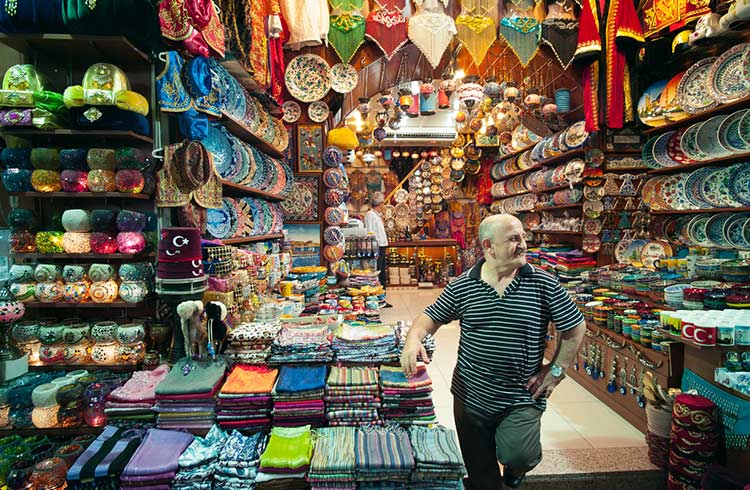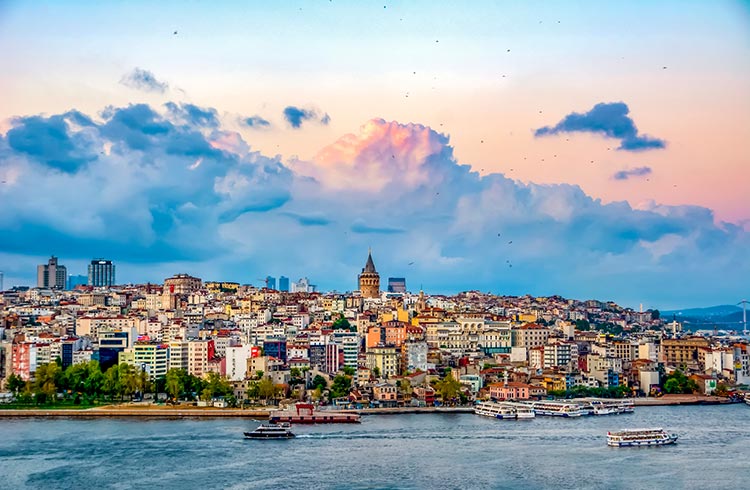How to Avoid Common Travel Scams in Turkey
How can you spot con artists from friendly locals in Turkey? Our Nomad shares her tips on how to avoid scammers and stay safe while traveling in Turkey.
 Photo © iStock/emreogan
Photo © iStock/emreogan
The first time I went to a local street pazar (weekly market) I was mesmerized by symmetrical displays of aromatic cantaloupes, lush cherries and juicy peaches on one stall, and nuts, plump dates and sweet dried apricots on another. I excitedly pointed out what I wanted and even though I tried to explain how much and how many of each, the vendors packed my bags so full I walked out with enough fresh and dried fruit to set up my own market stall.
I wasn’t scammed exactly. After all, I got what I paid for and everything tasted great, even the erik (green plums) I didn’t set out to buy. However I paid out more than I’d planned, and a lot more than on subsequent visits.
I look on it as a good learning experience and I’ve learned a lot of lessons that will keep you from getting taken advantage of during your trip to Turkey.
The first one is the upsell (remember the erik?). While the upsell might not technically be considered a rip-off, pretty much every scam can be avoided if you do some research and set boundaries before you go.
Taking the time to understand cultural nuances is a great way to prevent yourself from being duped. Armed with knowledge, you can relax and enjoy interactions with people, and be able to identify problematic behavior or possible threats, should they come your way. Here’s what you need to know to prevent two common scams before they even start.
- When a stranger invites you for a drink
- How to know you’re buying a real Turkish carpet
- Other scams to be aware of in Turkey
When a stranger invites you for a drink
Turkey has a rich and deeply ingrained hospitality culture, in part due to the influence of Islam.
Locals take great pride in their history, cultural heritage, and national identity and are eager to share it with visitors. Talking to tourists, and even asking direct or personal questions, is normal and doesn’t necessarily mean the local in question has an ulterior motive.
Especially in Sultanahmet and surrounding neighborhoods, including the Grand Bazaar, it’s customary for vendors to strike up conversations and offer you a tea or small gift, a hediye.
However, don’t accept “free” jewelry, chewing gum or flowers from random people on the street – unless you want to pay for it and be stuck carrying a flower around all day.
Similarly, if a person offers you an alcoholic drink or invites you to a bar, that’s a red flag. Alcohol is heavily taxed and very expensive relative to other goods in Turkey, making it extremely unlikely anyone is going to offer you booze for free.
A common scam, usually targeting lone male travelers, goes like this:
A man will approach you, say hello and engage you in conversation, and then ask if you want to get a drink.
He’ll recommend a bar or restaurant, saying it has the best wine or the best kebab and insist on taking you there. Once seated, you may be joined by a group of women or some of his friends.
At the end of the night, you’ll find yourself in possession of an inflated bill. If you refuse to pay, things could get very nasty.
Fortunately, this scam is incredibly easy to avoid. The internet veritably teems with reviews of bars and restaurants. Choose to go to reputable ones with positive reviews.
If your new “friend” insists that you only go to this particular bar he knows, and won't compromise on an alternative, don’t go with him. You can always find drinking buddies at trusted establishments recommended on review sites.
While you’re online, check out the Overseas Security Advisory Council report on Turkey and Travelscams.org, a crowdsourced database of scams spanning more than 100 countries, to see what other scams may be trending.
How to know you’re buying a real Turkish carpet
Turkish hospitality also permeates the business culture in Istanbul, a merchant city since Constantine founded it in 330 A.D.
Shopping here is more relational – and more protracted – than you may be used to. Just try buying a carpet without storytelling and tea. You’ll fail. In fact, it’s considered downright rude to talk money without first asking after each others’ families/health/countries and drinking the aforementioned beverage, gallons of it. Sellers aren’t necessarily trying to “butter you up”; this is just how business is done here.
Travelers to Turkey always worry about getting ripped off when buying a carpet. As in any country, there are a few dodgy dealers but, again, there’s a lot you can do beforehand to protect yourself.
Learn from my fruit debacle: decide what you want, how much of it, and what you can afford to spend before you even start looking.
Check out YouTube videos, articles, and the Turkish Cultural Foundation website for information about traditional Turkish crafts, including carpet weaving, so you know what to look for.
Understand what makes Turkish carpets distinct – especially from imports made from inferior synthetic materials. For example, Turkish rugs are traditionally made from wool, silk, and cotton yarn, which is colored with natural dyes like madder and indigo. Wool dyed this way has tonal variations that add visual depth and interest, while silk has luster and reflective properties that synthetic fibers can’t match.
Make a list of trustworthy sellers by talking to friends who’ve bought carpets in Turkey and then check their reviews online. Also look at the Turkish Cultural Foundation’s “Who’s Who” list to discover master artisans associated with various Turkish crafts and how to contact them.
These days most carpet dealers speak English so you can ask all the questions you need to make a choice. If you don’t want to carry your carpet with you, almost all of them can arrange to send it using an internationally known, reputable courier company. It’s very secure, reliable and quick. The dealer will weigh your carpet, tell you the delivery and insurance charges, and ask for your full contact details. Remember to take a photo so when your carpet arrives, you’ll know it’s the one you purchased.
Other scams to be aware of in Turkey
From time to time counterfeit money does the rounds in Turkey, usually in larger denominations, so don’t be embarrassed to check notes are genuine. Hold them up to the light and look for a thin line (a black metallic thread) running through the center. If you don’t see it, don’t accept the note.
Lastly, there’s the issue of taxis. Outside of big cities, they’re generally OK but in places like Ankara, and especially Istanbul, it’s essential to be on the alert, not least because they’re notorious for taking tourists the long way round. I only catch taxis to and from airports and favor older drivers because I imagine (or hope) they’re likely to be more honest and have more to lose by reckless driving. Luckily I’ve never experienced the money-switching scam expat friends and tourists have told me about. When they handed over a 50 or 100 lira note the drivers said they’d given him a 5 or a 20. The best way to avoid the problem of money switching is to hold up the note you’re paying with, maintain eye contact, and say the amount out loud. Most drivers understand the words for fifty (elli) or one hundred (yuz) in English.
It only takes a little research to avoid the most prevalent scams in Turkey. But after that, don’t sweat the small stuff. Does it really matter if you paid the yabancı (foreigner) price for that box of Turkish delight or set of teacups your mom adored? Do your homework before you come and don’t let the worry of being scammed steal the joy of traveling in Turkey.
Additional reporting by Lisa Morrow.
Related articles
Simple and flexible travel insurance
You can buy at home or while traveling, and claim online from anywhere in the world. With 150+ adventure activities covered and 24/7 emergency assistance.
Get a quote


21 Comments